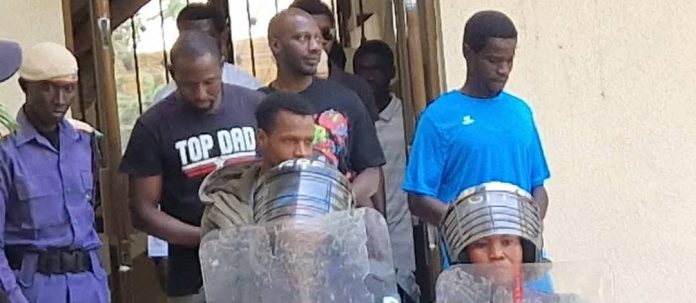By Kemeseng Sanneh (Kexx)
The robbery trial of three men accused of violently attacking the United Vegetable Oil Company on December 31, 2024, took a decisive turn on Wednesday as the defense mounted a vigorous challenge to the validity of confessional statements obtained by the police, raising questions about coercion and procedural fairness. The court is scheduled to rule tomorrow on whether these statements will be admitted into evidence — a decision that could critically impact the fate of Abdoulie Jallow, Losseni Diabate, and Ansumana Jarju.
The three men face serious charges including conspiracy to commit a felony, robbery with violence, and disabling to commit a felony or misdemeanor. The alleged incident, which took place near the Saro Denton Bridge in Banjul, involved a violent robbery at the United Vegetable Oil Company premises, an event that sent ripples through the local community.
The prosecution’s case heavily relies on confessional statements taken from the first two accused, Abdoulie Jallow and Losseni Diabate. Police Officer Karalang Badjie, assigned to the Serious Crime Unit in Banjul, provided detailed testimony on the procedures he followed to obtain both cautionary and voluntary confessions. Under examination by State Counsel M.D. Mballow, Officer Badjie described his interactions with the accused, including the presence of independent witnesses during the recording of statements.
“I first asked Abdoulie Jallow if he wished to make any statement regarding his earlier disclosures to the police,” Officer Badjie recounted. “He affirmed his willingness. I then secured an independent witness, Wahab Manneh, a carpenter unrelated to any security formation, to be present during the recording of the statement.”
Officer Badjie testified that the cautionary statement was read to Jallow, warning him that he was not obliged to say anything but that anything he said could be recorded and used. Jallow then provided a detailed account of the alleged robbery. The statement was read back to him, confirmed as accurate, and subsequently thumb-printed and signed by Jallow, the independent witness, and Officer Badjie himself. A similar process was described for Losseni Diabate, who gave his statements in Mandinka, his native language, with the same independent witness present.
However, defense counsel E. Sanneh contested the validity of these statements vigorously. Sanneh argued that both cautionary and voluntary confessions from Jallow were obtained under threat and undue influence, rendering them unreliable and inadmissible in court.
“Simply put,” Sanneh declared during his submission, “the first accused, Abdoulie Jallow, made those confessional statements because of the threats he was subjected to while in custody.” He further stated that upon initial arrest, Jallow had denied any involvement, telling the police he was unaware of the allegations.
Sanneh also highlighted that Jallow’s elder brother, Alagie Juldeh Jallow, was arrested separately and detained for four days at the Barra Police Station — a fact Sanneh suggested might have pressured Abdoulie Jallow into making the confessions.
State Counsel Mballow objected sharply to these claims. He argued that the defense was making statements “from the bar” — assertions presented without direct evidence or proper examination — and urged the court to expunge them from the record.
In response, Sanneh insisted that his submissions were crucial to explaining the legal grounds for the objection, referencing sections of the Evidence Act. “Counsel is entitled to present the factual context supporting legal objections,” he said, “and these facts are directly relevant to the court’s fair assessment of the confessions’ admissibility.”
The courtroom debate extended into a rigorous legal back-and-forth, with each side presenting detailed arguments about the law governing confessions and the protections afforded to accused persons. The defense argued that the conditions surrounding the statements violated the accused’s rights, while the prosecution maintained that proper procedures were followed.
The trial is scheduled to resume today morning at 11 a.m., when the court will deliver its ruling on the contested evidence.
















